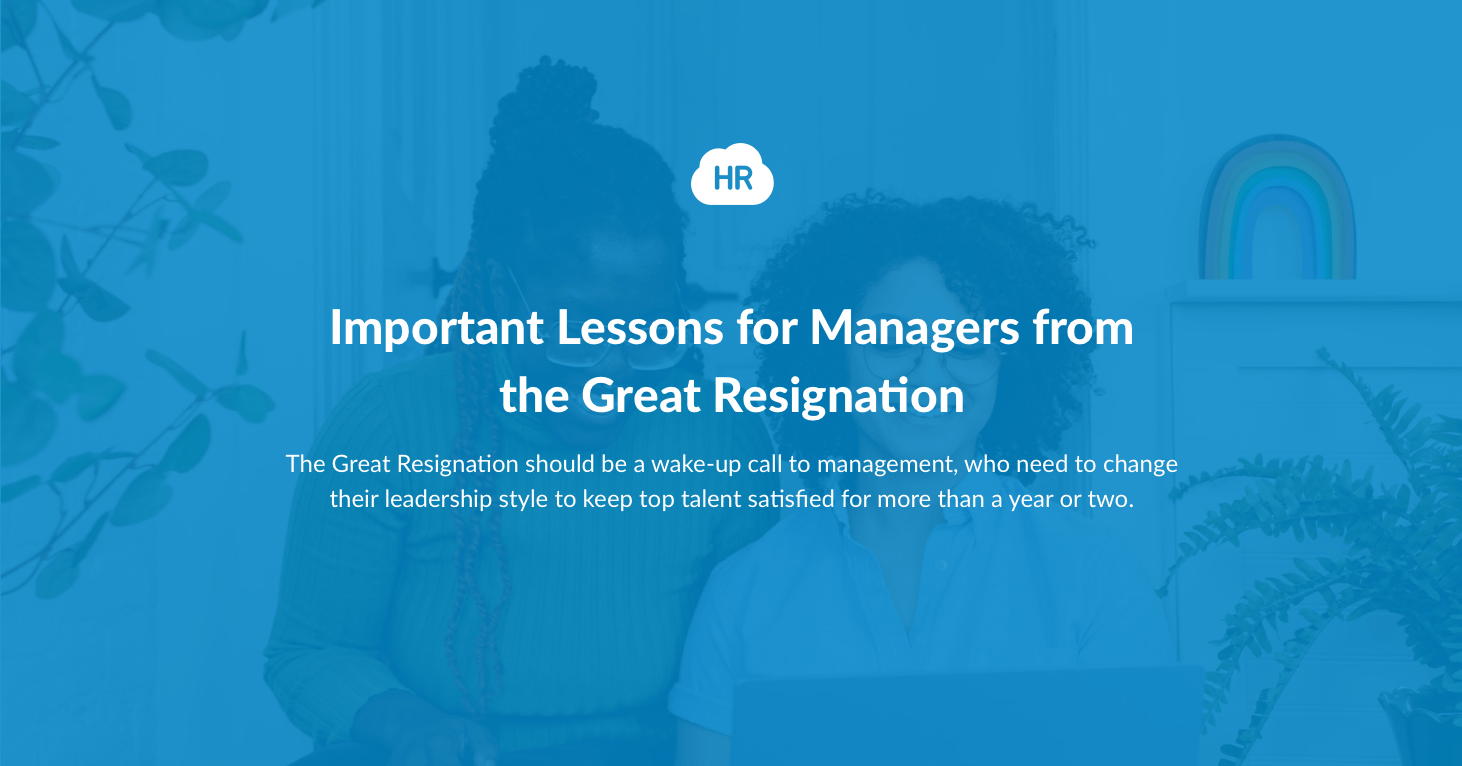Important Lessons for Managers From the Great Resignation



 Cut onboarding time
by 60%—here's the
Ultimate Checklist
that helped do it.
Cut onboarding time
by 60%—here's the
Ultimate Checklist
that helped do it.

Years of COVID pandemic conditions compelled employees to think critically about what they need from their employers to develop a happy and healthy life. Unfortunately for employers, many organizations have been found wanting, and tens of millions of workers have quit in search of more rewarding work. For about a year, business leaders have hoped that the Great Resignation was a temporary trend and that employees would return without much organizational change — but these business leaders are worse than wrong.
In a recent survey from Microsoft, 52 percent of millennial and gen Z workers were considering a change to their employment this year. The Great Resignation is far from over — and some experts suggest that it might never end. For decades, the concept of job loyalty has been loosening; before 2020, career experts encouraged employees to remain in one position for no longer than four years for maximum career benefit. In 2022, experts have shrunk that duration to two years, but most employees will quit before their first work anniversary.
The Great Resignation should be a wake-up call to management, who need to change their leadership style to keep top talent satisfied for more than a year or two. Here are a few lessons managers need to learn from this unprecedented employment event:
Leaders Should Not Assume They Know What Their Workers Want
Managers make all sorts of assumptions about personnel, especially about what workers want. Some managers assume that employees only care about monetary benefits, so any perk unrelated to increases in pay is utterly unimportant. Other managers believe that if a worker is not asking for any sort of support, they must be perfectly satisfied with their position.
Most managers were once humble employees, so they mistakenly believe that they understand their workers’ perspectives and know exactly what their team want and need from their employer. The problem is that ascending to management irrevocably shifts a manager’s view of the organization. With new knowledge about the company’s cash flow and responsibilities to budgets and deadlines, managers are unable to return to the perspective they had as mere workers. Thus, any assumptions they have about what workers want are all but certain to be false.
The Great Resignation has demonstrated that managers need to devote more time to understanding their employees. Instead of interacting one-on-one only in the annual performance review, managers and workers should develop closer relationships that help managers gain deeper insight into what motivates individual employees. Undoubtedly, some workers are driven by an interest in higher pay, but the Great Resignation shows that more employees receive more fulfillment by better treatment from their employer — which managers can supply through employee recognition programs. Dropping assumptions and committing to learning about employees allows managers more control over the satisfaction and performance of their teams.
Every Worker Needs to Feel a Sense of Purpose
A McKinsey survey found that 70 percent of people believe that the work they do every day defines their purpose in the world. Unfortunately, for many workers, the goal of their daily tasks does not always resonate with their internal motivations, and they lose the sense of purpose that would drive them to be more productive and more committed to their current position.
Managers need to find a way to demonstrate to workers that their effort has a meaningful and lasting impact on the world around them. A good start is working with senior leadership to develop corporate values and craft a mission statement that resonates with the workforce and customers alike. Managers should also push for policies that align with staff interests and needs, like going carbon neutral or offering family-oriented benefits. When employees know that they are directly contributing toward building a company that shares their core beliefs, they are more likely to connect with their purpose and give their all to their work.
Conclusion
It should go without saying that these are not the only two lessons managers need to learn from the Great Resignation. Employers overall need to find ways to pay their staff more reasonable wages, provide opportunities for advancement and generate a positive and rewarding workplace culture, which are three of the most common reasons cited by ex-employees for participating in the Great Resignation, according to Pew. Yet, with more communication between managers and employees and a greater focus on giving workers meaningful purpose, workplaces should be able to stem the tide of resignations and keep a stable team of productive and loyal workers.
Author Bio: This article is written by our marketing team at HR Cloud. HR Cloud is dedicated to providing powerful solutions for your HR teams and creating an exceptional employee experience. Our aim is to help your company improve employee engagement, onboarding, and to save you valuable time!
Keep Reading
Why Healthcare Organizations Choose HR Cloud Over Alternatives
What is the Best Healthcare HR Software for Medical Organizations?
The Complete Guide to Remote Work Policy Compliance: Navigating Multi-State Tax, Legal, and Security Requirements in 2026
With 22.9% of US employees working remotely as of Q1 2024—up from 19.6% the previous year
Enterprise HRIS Implementation: Rippling vs HR Cloud Integration Capabilities and Deployment Success
Enterprise HR Software Implementation Comparison
Like What You Hear?
We'd love to chat with you more about how HR Cloud® can support your business's HR needs. Book Your Free Demo

Build a Culture of Recognition. Boost Engagement. Guaranteed.
Workmates empowers employees to stay informed, connected, and appreciated—whether they’re on the front line, in the office, or remote. Recognition drives 12x higher engagement.Trusted by industry leaders in every sector




Cut Onboarding Costs by 60%.
Take the confusion and follow-ups out of onboarding with automated workflows, digital forms, and structured portals—so new hires ramp faster 3X quicker.Trusted by industry leaders in every sector




